Sometimes it ain’t easy living with a musician. Amps and instruments are your furniture. There are long, late nights of waiting at home or holding up a bar stool while he/she is out practicing with the band or playing a gig. Music will always be their first love, so you’re always a little jealous when it takes time away from you. Though, of course, there is also the bonus of strangers telling you how awesome your musician is – which is actually pretty cool. And I can attest to all of the above because I am Chuck Tipton’s kid.
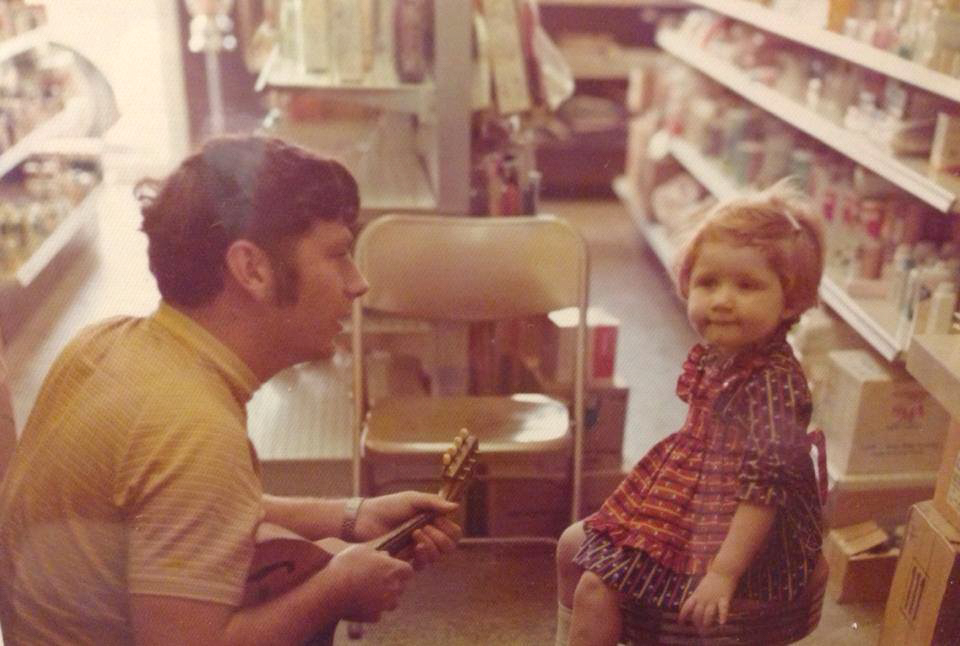
Growing up, the duality of Dad’s daytime profession as a sought-after commercial videographer/photographer was only slightly eclipsed by his nighttime side-hustle as a renowned guitarist, studio musician, and luthier. (For those who don’t know, a luthier is a maker of stringed instruments.) On any given day I am blessed to receive accolades for my Dad’s work from people who know him from both worlds, so to see him honored by having two of his Tipton Custom Guitars on display in the current special exhibit at the Birthplace of Country Music Museum – The Luthier’s Craft: Instrument Making Traditions of the Blue Ridge – alongside some of the best instrument makers in our region means a great deal to me.
Sometime in the late 1980s Dad declared: “If I can’t fix my own guitar, then I shouldn’t play one!” So he read everything he could get his hands on about the craft, converted my parents’ garage into a workshop, and never sent another guitar off for repair again. Soon he was doing repairs for friends and taking in work from local music stores. Around that time he also started building guitars, both acoustic and electric, and electric basses as well. Dad is among the elite few to achieve certification from C. F. Martin & Co. to service their guitars; he is also an authorized Fender repair technician. (And by the way, he does an awesome Tele replica!)
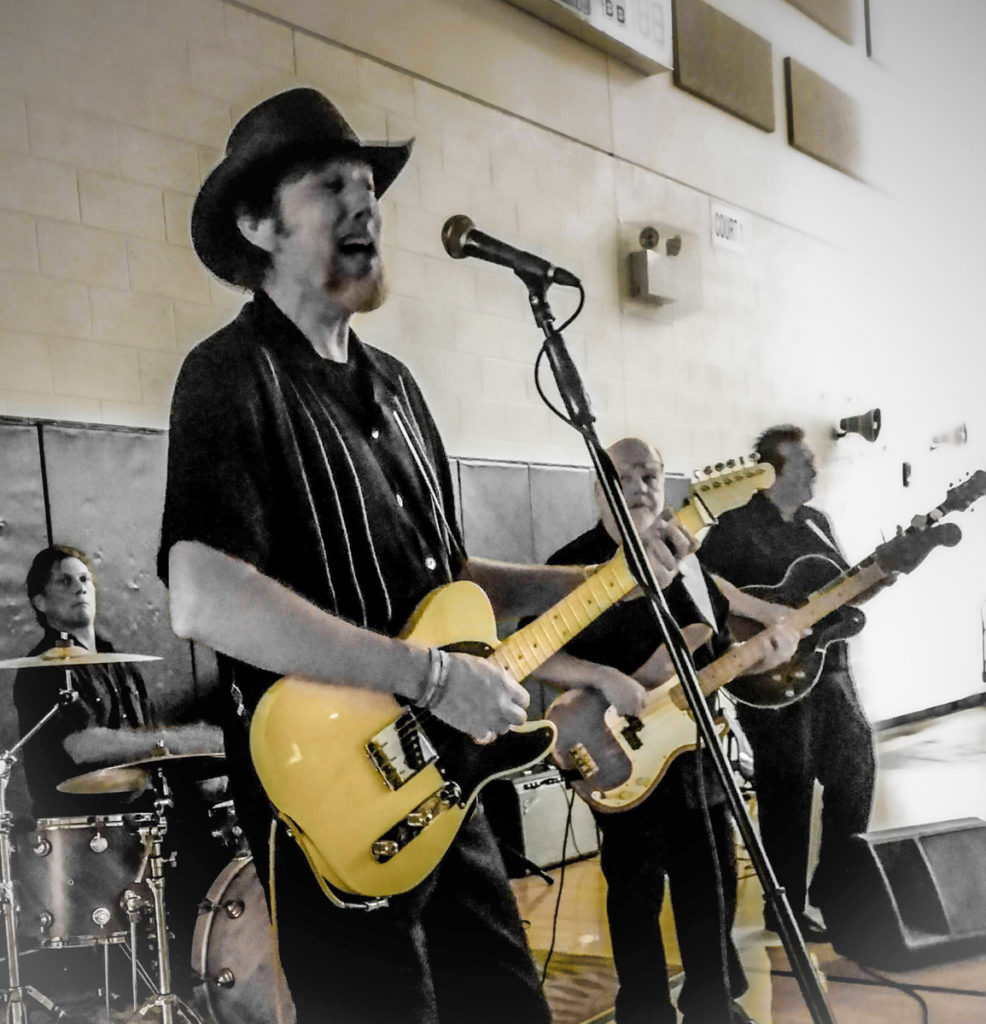
Dad’s expertise has brought some wonderful guitars into his workshop over the years. Chad Weaver, a family friend, was a local musician who moved on to work for many years as Brad Paisley’s guitar tech. Chad once trusted Dad to do some work on Brad’s famous 1968 Fender Pink Paisley Telecaster. Dale Jett, grandson of A. P. and Sara Carter, is another family friend and a customer of Dad’s. Dale inherited A. P.’s 1935 C. F. Martin & Co. 000-28 and has brought it over to Dad’s shop for work in the past. Dad loves working on instruments that have some history, and A. P.’s Martin was put on display and included in the programming for The Carter Family: Lives and Legacies, the first special exhibit curated by the Birthplace of Country Music Museum back in 2014.
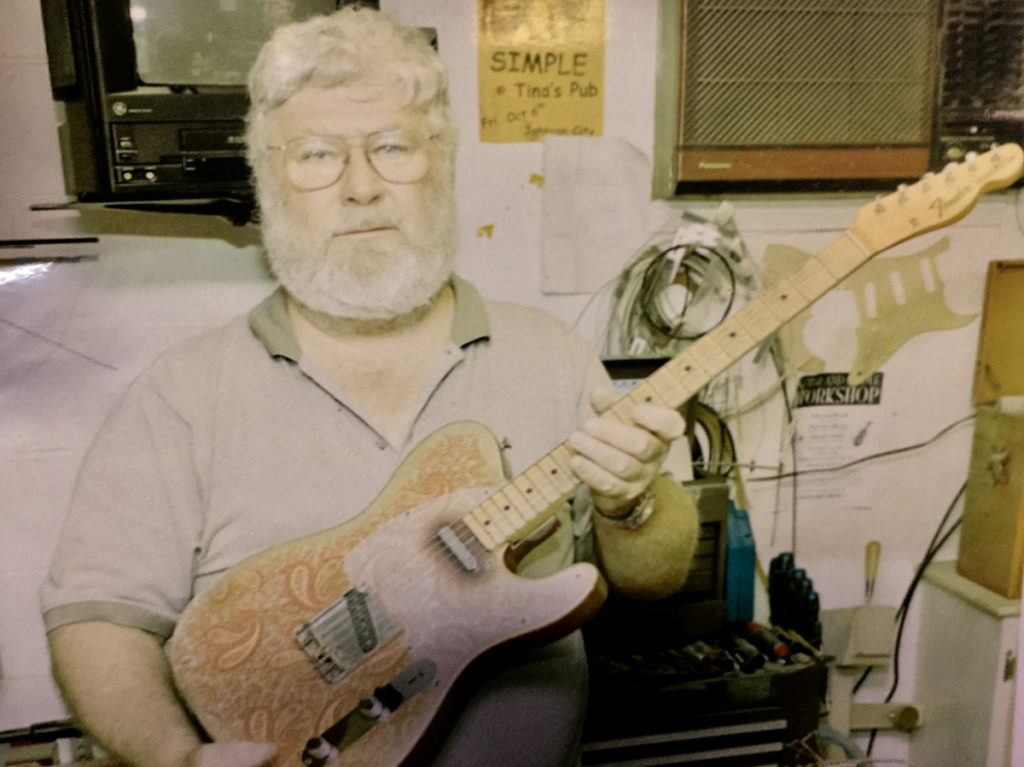
Musician Webb Wilder has made a stop or two in Dad’s workshop, and country music singer/songwriter Terri Clark owns an electric Tipton Custom Guitar, as does award-winning blues guitarist Deborah Coleman. And both Clark and Coleman listed Tipton Custom Guitars in their album liner notes – Clark’s Pain to Kill and Coleman’s Soft Place to Fall.
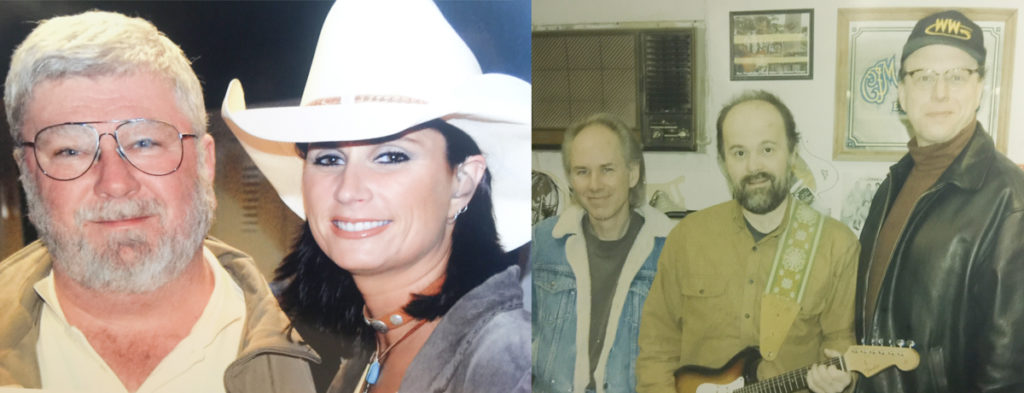
Dad is also a studio musician, and I’ve been told that Dad has likely a thousand album credits to his name. A thousand! He learned to play by ear at a very young age, and he’s played on a ton of records, primarily gospel and country. He once told me that he had to teach himself how to read and write music so he could lead recording sessions – whatever that entails. Sadly, the availability and affordability of DIY recording technology has rendered recording studios across the country an endangered species.
Dad doesn’t do much, if any, studio work these days, and a few of the shops Dad recorded in have either changed hands or no longer exist. He did a lot of work for Joe Deaton, owner of Tandem Records in Bristol, Virginia, in the studio that became Classic Recording Studio when Deaton retired. I remember napping in a chair while Dad laid down tracks during a marathon recording session there. Thankfully Classic is still in operation, though it has changed hands a few times.
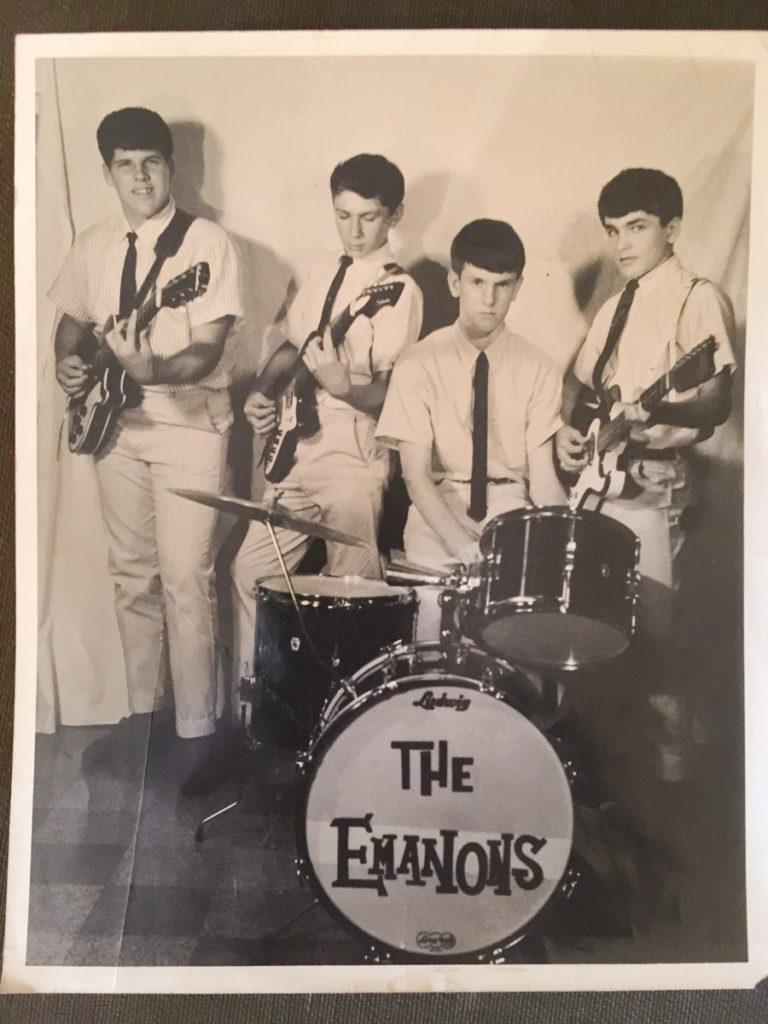
I also recall my brother Matt and I playing with the gooey chunks of vinyl that had dripped to the floor from the old record press they had at Tri-State Recording Studio in Kingsport, Tennessee. Tri-State no longer exists, but I did find them listed on Discogs.com, along with a number of records the company produced on their label. Lasting Sounds is another local studio that Dad spent a lot of time in over the years.
Outside the Tri-Cities he recorded at The Loft in Boone, North Carolina, Mark Five Recording Studios in Greenville, South Carolina, The Sounding Board in Easley, South Carolina, Church House Studios in Middlesboro, Kentucky, and Dawn Recording Studio in Ashville, North Carolina, where he played on the original recording of “Sweet Beuhlah Land” by Squire Parsons.
I was usually the first person to grab the phone when it rang in our house, and Dad got lots of calls from people like Charlie Maggard of Maggard Sound Studios and Joe Morrell of Morrell Music. They were always very nice to me and sometimes made small talk while we waited for Dad to pick up. I didn’t think much of it then, but looking back I see what a big chunk of this area’s music history I was witnessing without even realizing how significant it was. Sadly, neither Charlie nor Joe is still with us, but those men left a great legacy to the music culture of this region. Thinking about it now, perhaps some of these studios and their owners deserve blog posts of their own in the future!
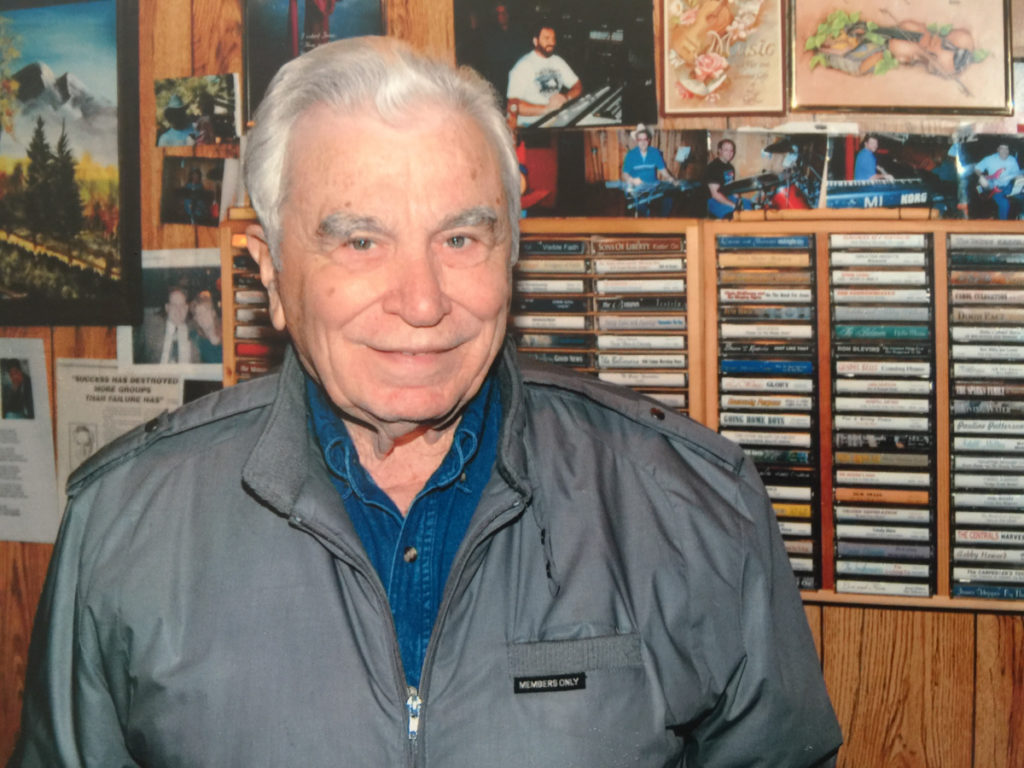
From music to camera work, my Dad has maintained the ability to eke out a living through his hobbies, and he is always finding a way to enjoy them too. Last year he even built a one-inch scale model steam traction engine that actually works! The truth is I’ve never known anyone with more ingenuity and determination. From his eye for lighting and shot composition to his keen ear for music, every skill Chuck Tipton has gained has been self-taught. I only feel shortchanged by the fact that I inherited ZERO of his genetic guitar genius or concentration; my younger brother got all that – he’s an amazing picker in his own right.
Dad is a man of few words and tends to shy away from the spotlight. He rarely talks about his accomplishments, so I didn’t appreciate the full scope of his work until I was older. And at the opening reception for The Luthier’s Craft special exhibit, I noticed the other luthiers who were there had the same quiet nature as my Dad until you got them talking about their work. I suppose they feel most at ease in the solitude of their workshops as opposed to big parties in their honor – which may explain why none of them were smiling in the photo I took at the reception!
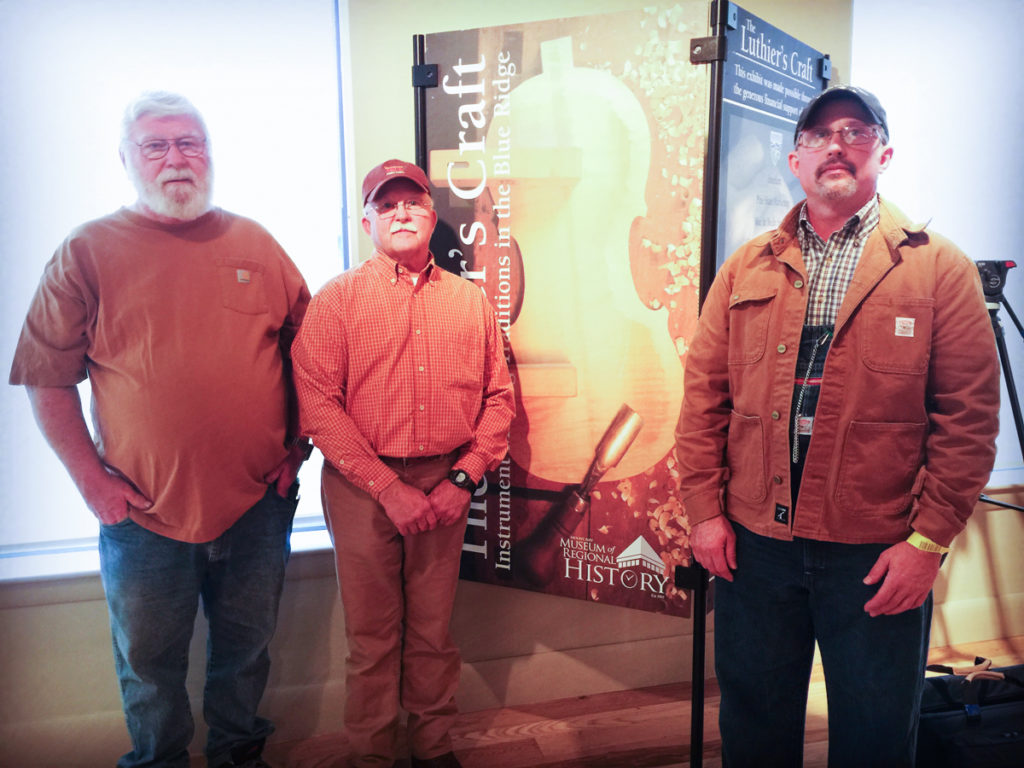
Rob Nicar and Doug Sims are the proud owners of the two Tipton Custom Guitars displayed in The Luthier’s Craft special exhibit. One of them – called “Redneck” – is the first guitar he ever built from scratch. When asked by the museum if they would loan the instruments for a while, both were anxious to know how long they would have to part with them. Doug said his only regret about having his guitar behind glass is that people won’t be able to hear how good Dad’s guitar sounds!
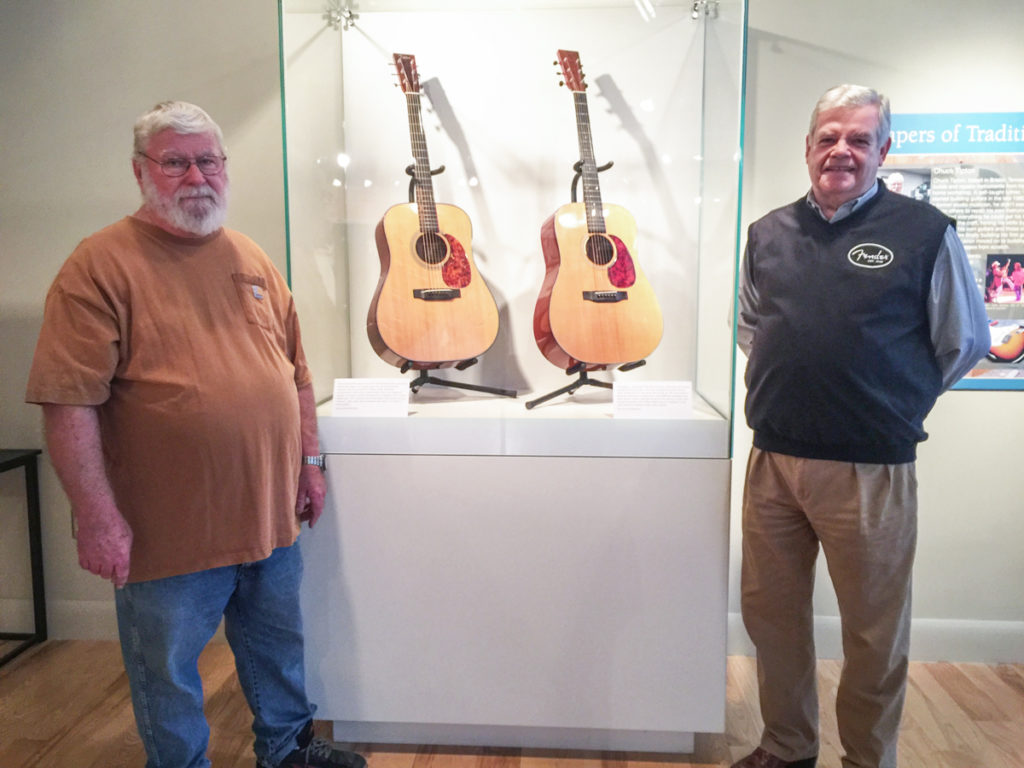
To say that I’m proud of my Dad would be an understatement. And though he would never say so, I know that being part of this special exhibit at the museum means a great deal to him. It’s the culmination of all the hard work he has done over the past three decades. He told me he has built around 90 instruments since he built his first guitar from a kit, though he doesn’t own a single one. He doesn’t do builds anymore – he says the repair work at the shop keeps him too busy – but I’m hoping being in this exhibit may inspire him to build at least one more for himself so that someday his grandkids will have a piece of this wonderful legacy, made with his own hands!
The Luthier’s Craft exhibit, produced by the Mount Airy Museum of Regional History, is open through March 4, 2018, in our Special Exhibits Gallery. Be sure to take the time to come see Chuck Tipton’s guitars, along with instruments from a host of wonderful local and regional luthiers!

